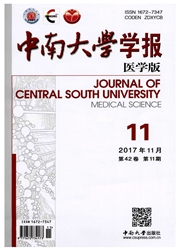

 中文摘要:
中文摘要:
目的:探讨只含梭基端的张力蛋白样分子(C-terminal tensin-like protein,CTEN)在肝癌中的表达及其与预后的关系。方法:采用免疫组织化学的方法检测240例肝癌患者的癌组织和癌旁组织CTEN蛋白的表达;采用卡方检验、Kaplan-Meier曲线和COX回归模型,对患者CTEN表达与临床病理特征、5年无复发生存期、总生存期以及预后的关系进行统计分析。结果:肝癌组织和癌旁组织CTEN蛋白的阳性高表达率分别为55.0%和20%(P【0.001)。CTEN表达与肝癌肿块大小(P=0.022)、血管侵犯(P=0.007)和TNM分期(P=0.021)正相关。CTEN高表达患者的5年无复发生存期(P【0.001)和总生存期(P【0.001)明显低于CTEN低表达的患者。COX回归分析显示CTEN高表达是肝癌患者术后复发的不良预后因子(P=0.001),也是患者死亡的不良因子(P=0.012)。结论:CTEN蛋白可能在肝癌的发生、发展中发挥作用,是肝癌的不良预后因子。
 英文摘要:
英文摘要:
Objective: To explore the correlation between the expression of C-terminal tensin-like protein (CTEN) and the prognosis of hepatocellular carcinoma (HCC). Methods: Using immunohistochemistry, we detected CTEN protein level in samples of primary lesion and adjacent non-tumor lesion collected from 240 patients with HCC. The relationship between CTEN expression and clinicopathology, 5 year recurrent-free survival, or overall survival was evaluated by Chi-square test, Kaplan-Meier, or Cox regression analysis. Results: High CTEN expression was detected in 55% of hepatocellular carcinoma tissues and 20%of adjacent carcinoma tissues (P<0.001). CTEN expression was positively correlated with tumor diameter (P=0.022), venous invasion (P=0.007) or TNM stages (P=0.022). Five-year recurrence-free survival time (P<0.001) and overall survival time (P<0.001) in patients with high CTEN expression were signiifcantly less than those in patients with low CTEN expression. Multivariate Cox regression analysis revealed that the CTEN expression was an independent prognostic marker for HCC (all P<0.05). Conclusion: CTEN protein may play a role in the genesis and development of HCC, and it can function as a prognostic marker.
 同期刊论文项目
同期刊论文项目
 同项目期刊论文
同项目期刊论文
 BTB/POZ domain-containing protein 7: Epithelial-mesenchymal transition promoter and prognostic bioma
BTB/POZ domain-containing protein 7: Epithelial-mesenchymal transition promoter and prognostic bioma Comparative proteomic study for profiling differentially expressed proteins between Chinese left- an
Comparative proteomic study for profiling differentially expressed proteins between Chinese left- an WD40 repeat-containing 62 overexpression as a novel indicator of poor prognosis for human gastric ca
WD40 repeat-containing 62 overexpression as a novel indicator of poor prognosis for human gastric ca High Expression of SOX2 and OCT4 Indicates Radiation Resistance and an Independent Negative Prognosi
High Expression of SOX2 and OCT4 Indicates Radiation Resistance and an Independent Negative Prognosi Association between mismatch repair gene andirinotecan-based chemotherapy in metastatic colon cancer
Association between mismatch repair gene andirinotecan-based chemotherapy in metastatic colon cancer HK2 is a radiation resistant and independent negative prognostic factor for patients with locally ad
HK2 is a radiation resistant and independent negative prognostic factor for patients with locally ad Bone morphogenetic protein-4 induced rat hepatic progenitor cell (WB-F344 cell) differentiation towa
Bone morphogenetic protein-4 induced rat hepatic progenitor cell (WB-F344 cell) differentiation towa 期刊信息
期刊信息
